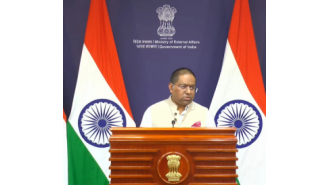Top official praises Odisha as a pioneer in climate-resilient and inclusive farming practices.
Odisha is becoming a pioneer in sustainable agriculture, focusing on inclusion, diversification, and resilience to climate change, says government official.

In an interview with PTI, Arabinda Kumar Padhee, the Principal Secretary of the Department of Agriculture and Farmers' Empowerment of the Government of Odisha, shared insights about the state's comprehensive vision to transform agriculture into a sustainable and equitable growth driver. He emphasized that Odisha is emerging as a leader in sustainable agricultural practices with a focus on inclusivity, diversification, and climate resilience.
Padhee highlighted the significant role of agriculture in Odisha's economy, contributing 22% to the state's Gross Value Added and providing livelihood to 55-60% of the population, especially in rural and tribal areas. However, with almost half of the farmland dependent on rainfall, the state is prioritizing region-specific strategies to address potential vulnerabilities.
To achieve this transformation, Odisha has been collaborating with global research organizations like the International Food Policy Research Institute. Padhee also mentioned that while paddy remains the dominant crop, the state is actively promoting high-value crops such as vegetables, pulses, oilseeds, and millets through initiatives like Agri-Production Clusters to foster diversification. Additionally, the implementation of rice-fallow management has proven to be beneficial in improving soil fertility and increasing farmer incomes by introducing pulses and oilseeds in fallow lands.
Considering the frequent natural calamities like floods and cyclones faced by Odisha, Padhee acknowledged the significant challenge posed by the changing climate. He stated that only three years between 1972 and 2022 have been free from extreme weather events, including floods, droughts, and cyclones. In response, the state has introduced submergence-tolerant and drought-resistant crop varieties and salt-tolerant strains to make agricultural practices more climate-resilient. A dedicated Climate Resilience Cell has also been established to integrate sustainability into every new project, positioning Odisha as a pioneer in adaptive agriculture.
When asked about smallholder farmers in the state, Padhee expressed that with over 92% of the agricultural community consisting of smallholders, collective bargaining through Farmers' Producer Organisations has enhanced market access. He also mentioned the use of digital tools to provide crop-specific advice and the Mukhyamantri Krushi Udyog Yojana, which promotes rural entrepreneurship. Women farmers are also being empowered through higher subsidies, skill development programs, and decision-making roles.
Padhee further highlighted Odisha's efforts in reviving traditional crops like millets, known for their resilience and nutritional value. He explained that the state has a Forgotten Food Policy and recently held an international symposium to bring attention to the importance of underutilized crops in addressing food security and environmental sustainability.
In conclusion, Padhee reiterated that Odisha's vision for sustainable agricultural development is rooted in inclusivity, sustainability, and resilience. By leveraging technology, climate-smart practices, and evidence-based policies, the state aims to enhance productivity while ensuring equitable growth for smallholders, women, and tribal communities. He also emphasized that Odisha is setting an example for sustainable agricultural development across India with its focus on organic farming, agrobiodiversity, and climate-smart practices.
10 Views










